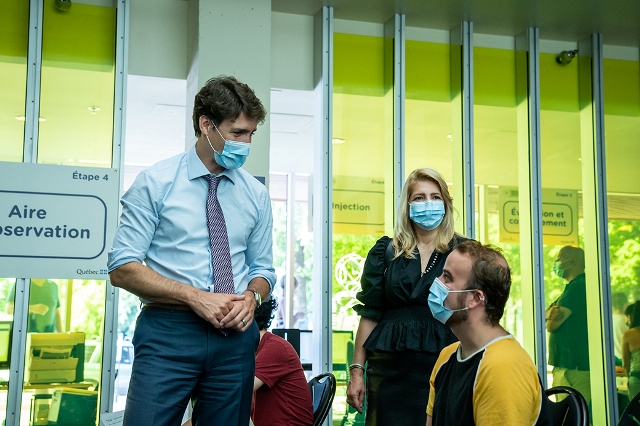 Justin Trudeau visits a Montréal vaccination site in July 2021. [photo: Adam Scotti, Office of the Prime Minister, OPM website]
Justin Trudeau visits a Montréal vaccination site in July 2021. [photo: Adam Scotti, Office of the Prime Minister, OPM website]
Justin Trudeau won another term as Canada’s prime minister but failed to secure an outright majority – the gamble that prompted him to call the third general election since 2015. His Liberal Party won a lower share of the first-past-the-post vote than the opposition Conservatives, led by Erin O’Toole. With 170 seats needed for a parliamentary majority, the centre-left Liberals gained only two seats, winning 159 on the lowest-ever winning vote share of 32.6% (even less than 2019’s 33.06%) to the Conservatives’ 119 seats, down two, on 33.7%, Elections Canada reported.
The Bloc Québécois, rooted in the sole Francophone province, won 33 seats (up two, on a 7.6% share of the vote), while the left-wing New Democratic Party (NDP), led by Jagmeet Singh, which has wide but thinly spread support, won 25 seats (up one) but with 17.8% of the vote. The Greens won two seats on 2.3% – a disappointing result with their lowest vote share since 2000.
Maintaining the ‘Western alienation’ that existed when Trudeau’s father, Pierre, was Liberal prime minister, the country is still divided geographically, with Saskatchewan a clean sweep for the Conservatives, though the Liberals and NDP won two seats each in Alberta. The Times saw this potentially becoming a ‘full-blown separatist movement’, quoting a candidate for the newly formed Maverick Party emphasising the ‘unique culture, unique economy’ of the west. ‘All the votes are in Ontario and Quebec,’ he said. ‘We got left behind.’
The election coincided with a surge in Covid cases as the Delta variant swept the country but Trudeau met anti-vaccine protests while campaigning, having stones thrown at him at one stop. As the results came in, he told supporters that ‘millions of Canadians have chosen a progressive plan’ but O’Toole said the polls had been a waste of time and money, saying: ‘Canadians sent him back with another minority at a cost of C$600m [£350m] and deeper divisions in our great country.’
However, O’Toole also had a disappointing result as he had campaigned on a more centrist platform in an effort to expand the Conservatives’ vote, shifting the party’s stance on gun control, abortion rights and climate change. This swing to the centre may have lost the Conservatives crucial votes to the People’s Party of Canada (PPC), a populist group that is avowedly anti-immigration, anti-establishment, anti-vaccine and anti-science. The Toronto Star reported that far-right and white nationalist groups had been urging supporters to back the PPC, which did not win any seats but became the fifth biggest party, garnering a 4.9% share of the vote.
After calling the election only two years after the last, Trudeau met disinterest from many voters and anger from some. He was rewarded with a turnout likely to be a record low of 58%. The Liberals’ ratings crumbled during the campaign as the NDP ate into their vote – from dominance across most demographics and regions at the beginning to slipping behind the Conservatives.
The Calgary Herald suggested it was ‘the least consequential Canadian election ever’ that created ‘deeper political divisions’. Its analyst concluded: ‘Trudeau took his shot at a majority, missed, and nothing much changed.’ But Prof Lori Turnbull, of Dalhousie University, told the Guardian that Trudeau had an opportunity ‘to cement a legacy’ by passing key legislation with the help of Singh’s NDP, such as a plan for affordable childcare and climate policies that build on his carbon tax.



